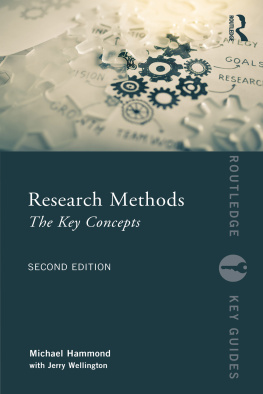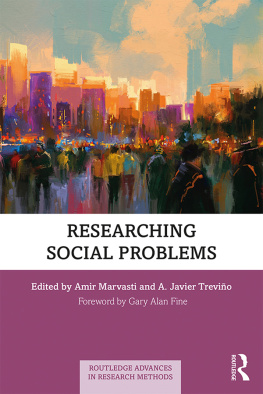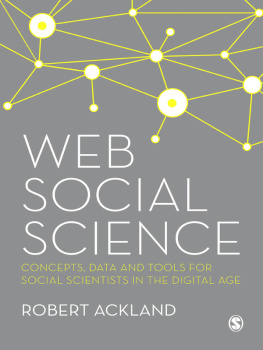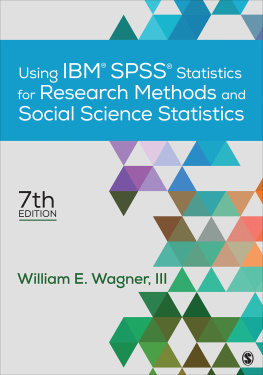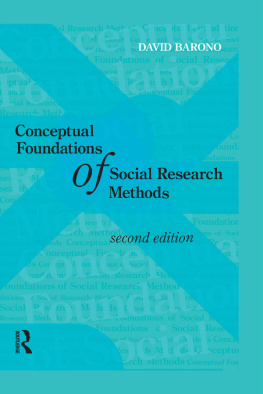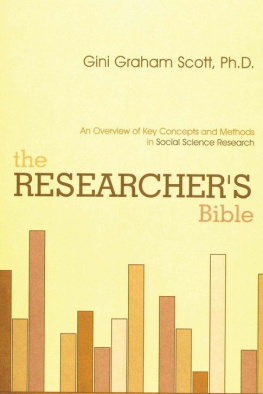Research Methods
This book provides an overview of ninety key concepts which often trouble those who are new to researching within the social sciences. It covers theories of knowledge, methodologies and methods. Each entry offers a definition of a concept, shows how researchers have used that concept in their research and discusses difficulties that the concept presents. The book supports those undertaking their own social research projects by providing detailed critical commentary on key concepts in a particularly accessible way.
In exploring these concepts, a wide range of research reports across many different fields are described. These include not only classic accounts, but also a broad selection of recent studies, some written by new researchers. The book will be useful for higher-education students carrying out projects within social science faculties at the end of their first degree or during a masters programme, though it will also be particularly helpful for those undertaking doctoral research, and some entries have been written with the production of a thesis in mind.
This second edition of Research Methods: The Key Concepts provides a more comprehensive and up-to-date coverage, as old entries have been updated and 19 new entries added. It helps new researchers to navigate the changing landscape of social research by recognising (a) the changes in the ways researchers are thinking about knowledge and acquiring knowledge, (b) the increasing use of digital tools to collect data, and (c) the desire many contemporary researchers feel to promote social justice through their research.
Michael Hammond leads an MA in social science research and is Reader in Education at the University of Warwick, UK.
Jerry Wellington was a Professor and Head of Research Degrees in the School of Education, University of Sheffield, UK, and is now an educational consultant.
Research Methods
The Key Concepts
Second Edition
Michael Hammond
With Jerry Wellington

Second edition published 2021
by Routledge
2 Park Square, Milton Park, Abingdon, Oxon OX14 4RN
and by Routledge
52 Vanderbilt Avenue, New York, NY 10017
Routledge is an imprint of the Taylor & Francis Group, an informa business
2021 Michael Hammond and Jerry Wellington
The right of Michael Hammond and Jerry Wellington to be identified as authors of this work has been asserted by them in accordance with sections 77 and 78 of the Copyright, Designs and Patents Act 1988.
All rights reserved. No part of this book may be reprinted or reproduced or utilised in any form or by any electronic, mechanical, or other means, now known or hereafter invented, including photocopying and recording, or in any information storage or retrieval system, without permission in writing from the publishers.
Trademark notice : Product or corporate names may be trademarks or registered trademarks, and are used only for identification and explanation without intent to infringe.
First published by Routledge in 2013
British Library Cataloguing-in-Publication Data
A catalogue record for this book is available from the British Library
Library of Congress Cataloging-in-Publication Data
A catalog record has been requested for this book
ISBN: 978-0-367-17873-4 (hbk)
ISBN: 978-0-367-17874-1 (pbk)
ISBN: 978-0-429-05816-5 (ebk)
Typeset in Bembo
by Deanta Global Publishing Services, Chennai, India
Contents
This is the second edition of Research Methods: The Key Concepts , one in a series of key guides. In preparing this edition we have added 19 new entries, and we have revised and updated references to literature in nearly all of the others. The book provides a more comprehensive and up-to-date coverage of approaches taken in social research and the methods used to address research questions. The aim of this book, however, remains the same: to provide support for those undertaking their own social research projects. Each entry in the book provides an overview definition, or competing definitions of a concept, followed by a discussion of the part played by that concept in a research project. A wide range of research reporting is cited. This includes not only classic accounts such as Oscar Lewiss The Sanchez Family , Durkheims Suicide , Webers The Protestant Ethic and the Spirit of Capitalism , but also a broad selection of recent studies, some written by new researchers, across many different fields and contexts. The book will be useful for higher-education students carrying out projects at the end of their first degree or during a masters programme, though many of the entries will be particularly helpful for those undertaking doctoral research, and some entries have been written with the production of a thesis in mind.
The book is titled Research Methods , but its scope goes beyond this. We do of course cover research design and particular methods of collecting and analysing data, for example questionnaire surveys, interviewing, observation and related activities such as coding, and inductive (or bottom-up) and deductive (top-down) approaches to analysis. We present a critical view of methods, setting out strengths and weaknesses of different approaches, making clear that there is not a simple formula to follow. However, we also raise wider issues including epistemological orientations to research, such as the nature of claims to reliability, trustworthiness and validity, and we consider stances such as constructionism, interpretivism, positivism, post-positivism, postmodernism and pragmatism. We are particularly concerned in this edition to say more about the role that theory plays in social research and have added further entries on conceptual frameworks, modelling, theoretical frameworks and extended the original entry on theory itself. The aim is to show that those undertaking social research need to engage more widely with how problems have been theorised if they are to make a distinctive contribution to the field. In all the entries we aim to be even-handed, but we do express firm views where we feel a difficulty or limitation needs to be highlighted.
Entries are in alphabetical order and, where appropriate, cross-referenced by the use of bold, though this is done sparingly so as not to disrupt the reading of the text. An extended Short Bites section is provided at the back of the book which contains brief definitions for terms which have come up within the entries themselves. These entries will help readers decode some of the research output cited throughout the guide.
Guides to social research are rarely read cover to cover, but we would encourage readers to visit at least some of the entries on concepts with which they are unfamiliar or of which they may be dismissive; the signposting will help. Of course many readers will prefer to dip into the book as and when they need to, and the alphabetical organisation makes this straightforward.
Why this book?
In writing the first edition we noted that the book was informed by our experience in leading workshops with student researchers as well as supervising and examining research degrees. At the time of writing this second edition we continue to be much encouraged by the high quality of research being undertaken and the passion with which new researchers present their projects. We also admire the flexibility shown by new researchers and their refusal to engage in pointless debates as to whether quantitative or qualitative methods are 'better. However, the difficulties we noted at the time of the first edition are still present and worth repeating here:

